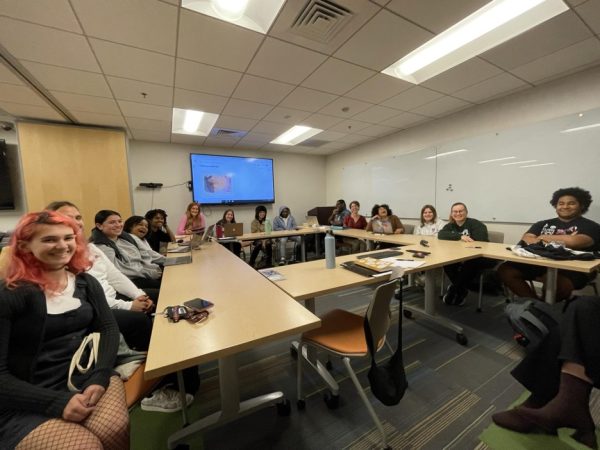The Artificial Intelligence Takeover Has Begun
The following represents the opinion of the student reporter and does not represent the views of Loyola University Maryland, the Greyhound, or Loyola University’s Department of Communication.
Large language models (LLMs) are here to stay. These are artificial intelligence systems that can generate natural, fluent and coherent text on any topic, given some input. They can also converse with humans, answer questions, write code and perform other tasks that require natural language understanding and generation.
Some of the most popular LLMs today are ChatGPT, Bard, and Bing. ChatGPT is developed by OpenAI, a research organization backed by tech luminaries like Elon Musk and Sam Altman. Bard is created by Google, based on its Language Model for Dialogue Applications (LaMDA). Bing is powered by Microsoft, using its own proprietary technology.
These LLMs have attracted millions of users who use them for various purposes, such as entertainment, education, productivity, and creativity. Some examples of how people use LLMs are:
– Chatting with ChatGPT for fun, learning or companionship. ChatGPT can engage in casual conversations, tell jokes, stories and trivia, and even flirt with users. It can also adapt to different personalities and tones, depending on the user’s preferences.
– Using Bard to generate ideas, summaries and content. Bard can help users with writing tasks, such as drafting emails, blog posts, presentations and essays. It can also provide suggestions, feedback and insights on various topics and domains.
– Leveraging Bing to search for information, answers and solutions. Bing can not only provide relevant web results, but also generate natural language responses that explain the results or provide additional details. It can also solve problems, such as math equations, puzzles and quizzes.
The benefits of using LLMs are manifold. They can save time, enhance creativity, improve communication and expand knowledge. They can also provide entertainment, comfort and support. However, there are also some challenges and risks associated with LLMs, such as:
– The quality and reliability of the generated text. LLMs are not always accurate or factual, as they rely on probabilistic methods and large amounts of data that may contain errors or biases. Users need to be aware of the limitations and uncertainties of LLMs, and verify the information they provide.
– The ethical and social implications of the generated text. LLMs may produce text that is harmful, offensive or inappropriate, either intentionally or unintentionally. Users need to be responsible and respectful when using LLMs, and avoid generating or spreading text that may cause harm or offense to others.
– The security and privacy of the user data. LLMs may collect and store user data, such as queries, responses and preferences, for improving their performance or providing personalized services. Users need to be aware of the data policies and practices of the LLM providers, and protect their personal information and identity.
LLMs are a powerful and promising technology that can transform the way we interact with information and each other. They offer many opportunities and benefits for users who want to explore new possibilities and enhance their capabilities. However, they also pose some challenges and risks that require caution and awareness from users who want to use them safely and ethically.
I would like to give Microsoft Bing a special thanks for writing all of that for me.
Here is the prompt I fed it to get that response: Write a NYT article about how LLMs like ChatGPT, Bard, and Bing are here to stay, and how people use them as a benefit. It took ten seconds to generate all of that text.
My Experience Using LLMs
I’ve spent some time using all three platforms listed above. Both Microsoft Bing and ChatGPT are free to use to the public, but for Bard, you must join a waitlist. Of all three of them, ChatGPT-4 is the most advanced, followed by Bing and then Bard.
Bing is more informational and research based, while ChatGPT and Bard are more conversational based. You can feed them ludicrous tasks and it will fulfill them, as long as it isn’t deemed offensive. The most creative thing I got ChatGPT to do was pretend to be Barack Obama giving a speech about the pandemic, but structured as if it was written like the King James version of the Bible. Needless to say, it’s pretty remarkable. The current version of OpenAI’s platform is called ChatGPT-4. It only has access to information leading up to September 2021.
Microsoft Bing is much different, and I have been using it for a couple of weeks now. You can access it by using the Bing search engine, however, if you use Microsoft Edge as a browser, it has a dedicated button that you can press. Bing is separated into three options, the Chat feature, the Compose feature, and insights. I created the snippet above using the Compose feature, which allows you to do anything from paragraphs to emails, with different tones and lengths. However, the feature I find myself using the most is the Chat feature.
The Chat feature works differently than ChatGPT. First you select a tone of response: either creative, balanced, or precise. For the sake of my usage, I have been using precise. Afterward, you simply enter in whatever you want to know and it will scour the internet for responses and then generate a response based on sources that it pulls. The sources can be accessed either by clicking on the text, or by clicking the links at the bottom.
Bard by Google is like ChatGPT, except that it has access to the internet. However, it is by far the worst one. While it is able to generate responses faster than its competitors, the information is more often than not incorrect, and I have noticed that it has biases that can be considered problematic. Google says that Bard is experimental and a work in progress, and it is clear that this program certainly needs more work.
GPT in the Classroom
Based on the popularity, it is very clear that LLMs are here to stay. However, the quick rise in use has left educators scrambling to adapt. Some applications, like TurnItIn, are able to detect writing created by artificial intelligence. Yet, that may not dissuade some students from using it, so the question now becomes: Should LLMs like ChatGPT be outright banned, or should educators learn to adapt its usage into the classroom?
I believe that the latter is a much more practical answer for the classroom. ChatGPT and Bing should be treated as tools, just as search engines and databases are. As these programs are slowly being implemented into browsers and other services, to outright ban them would do more harm than good. But what is stopping students from using it to blatantly cheat? Trevor Oberlander ‘24 has a pessimistic view on this.
“College degrees are worthless now because of ChatGPT,” he said. “If everyone is cheating, learning in class becomes redundant.”
Oberlander, an economics major, says that GPAs can no longer be considered a unit of measure for school, since it is impossible to tell if legitimate work was done to receive the number. The amount of effort between students is incomparable if it is impossible to tell who actually put in effort to do work.
Lily Tiger ‘24 is also skeptical about LLMs. As an English major, she is very worried about the future of education and job security with her degree.
“I went to a career fair and I asked if anyone has any positions for experience with research and writing skills,” she said. “If that is what ChatGPT can do then it makes me feel threatened.”
Tiger is also considering a career path in high school education, so the prospect of a readily available and free answer machine makes her nervous for schooling in the future. She also believes that the education system needs to adapt or somehow integrate LLMs into the classroom.
“We can’t see it as a fear, because it’s already here. If we refuse to talk about it, that isn’t a good idea. Teachers need to learn how to use this with their students as a resource,” Tiger said.
What’s in store for the future?
While ChatGPT is currently a novel technology, in the five month timeframe between the release of GPT-3 and GPT-4, the abilities of the artificial intelligence have grown exponentially. In a recent interview on the Lex Fridman Podcast, Open AI’s CEO, Sam Altman, stated that ChatGPT, “will make a lot of jobs just go away.”
I came across a TikTok recently that showed how GPT was integrated into a software program that creates over 100 professional grade headshots, based on a photo that the user submits. This is all done in mere hours. That right there is an industry killer, and the professional photography industry is not the only one affected so far. OpenAI recently announced that Shopify users will now have the ability to integrate a GPT-powered customer support “representative” on their online stores. Now, the customer support industry has been flattened as well.
ChatGPT is slowly creeping into every facet of our daily lives. Spotify now has a ChatGPT powered DJ that mimics a human DJ, and plays music tailored to your taste. Quizlet now has a GPT study partner, which asks you surprisingly in depth questions about flashcards that the user has provided. Even Snapchat has released a premium feature called “My AI,” which is a virtual friend that users can communicate within their Snapchat+ subscription. CNET, a company which writes news about technology and consumer electronics, revealed earlier this year that they have used artificial intelligence to write dozens of their articles.
Needless to say this phenomenon is not going away anytime soon. In fact, I would say that it is here to stay. So what is the solution for the AI takeover? Unfortunately, I do not think that there is an answer that would satisfy everyone. On one hand, LLMs are quickly proving to be an excellent resource for many. However, concerns about the ethics of using it are very real. And with Sam Altman outright saying that entire industries will be replaced by AI, the cause for concern is warranted.
A petition is currently circulating online which has been signed by the likes of Elon Musk and Apple co-founder Steve Wozniak. The petition is calling for the halt of AI development past ChatGPT-4 for at least six months. The main tenet of this petition is that “Powerful AI systems should be developed only once we are confident that their effects will be positive and their risks will be manageable.”
The petition goes on to state that OpenAI recently announced that “At some point, it may be important to get independent review before starting to train future systems, and for the most advanced efforts to agree to limit the rate of growth of computers used for creating new models.” The signers believe that now is the time for them to do this. They are worried about the competitiveness of AI and the idea that we are quickly entering a stage in technological evolution, where AI could become human-like.
I’m not one to toot the horn of someone like Elon Musk, however, we are clearly at a pivotal moment in the history of technology. It is incredible what ChatGPT and other LLMs can do, however, I feel that we as a society should tread lightly down the artificial intelligence road. Science fiction is full of stories regarding artificial intelligence takeover. While I do believe we are leagues away from that happening, we should still err on the side of caution.

















































































































